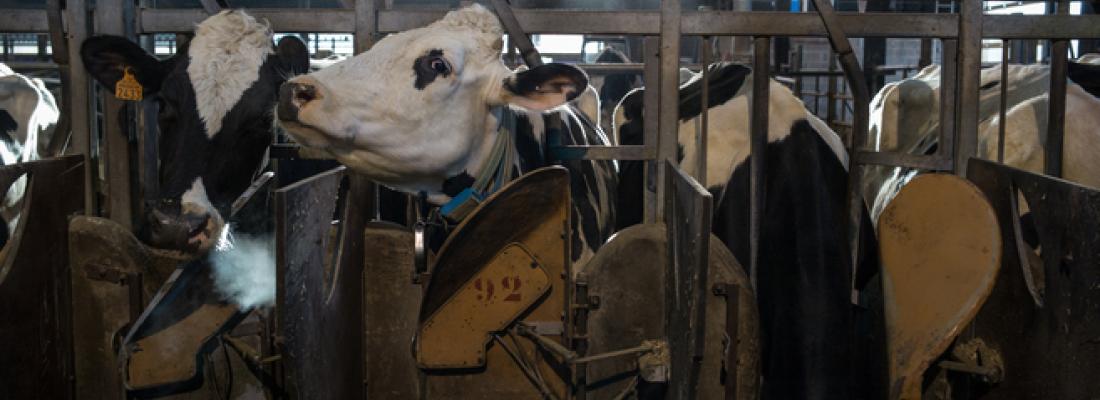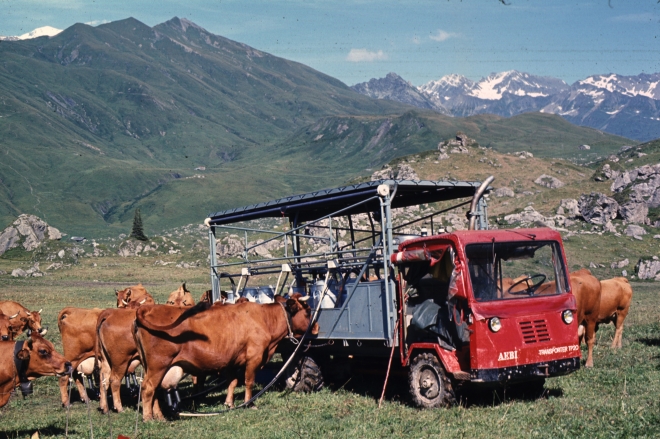Society and regional strategies Reading time 3 min
Dairy cows: all in a day’s work
Published on 13 March 2017

It is widely accepted that police dogs, seeing eye dogs and shepherd dogs work. But what about livestock animals? They are given no credit, let alone attention, when it comes to rural sociology and the world of work. Studies carried out at INRAE are changing that; they have shown that cows and pigs contribute to work, not by conditioning but with their very own “personalities”. Cows invest their intelligence and sensibilities in their work.
Tell us what you learned by observing cows
Jocelyne Porcher: Cows understand the rules imposed on them by farmers (1). For example, they understand that it’s time to leave their cubicles when the farmer starts spreading hay. Some of them prepare to get a move on ahead of time, and others wait until they hear the farmer before starting to budge. In the waiting area before the milking machines, where cows are given some freedom, a whole host of behaviours has been observed: cows avoid conflict, act politely, or on the contrary exercise authority based on a hierarchy among them. For example, a cow thought it was good fun to block access to a milking machine for 40 minutes: she tried to stick her head in the trough without entering the machine completely, to get something to eat without being milked. This type of behaviour proves that cows understand how the machine works.
What do cows expect to get out of their “work”?
J. P.: Just like for people, recognition is one motivation to work. In livestock systems, this recognition requires a reciprocal judgement that can be qualified as a “link judgement”. For cows, the link judgement has nothing to do with what is accomplished, but with the means of working: they are not concerned with their performance curves in dairy production but rather their working conditions. And they expect recognition for a job well done. This recognition may simply be the absence of any kind of intervention from farmers who are not very demonstrative. That is proof enough that the cows are doing what is expected of them.
For people as for animals, there is work and then there is work. Some work emancipates while other work alienates. The positive or negative effects of work depend on the production system. Work can heighten the sensitivity of animals and develop their capacities or, on the contrary, stultify and make them suffer. Work is all the more positive if it allows animals to stay connected to their world: pastures for cows, who are ruminants, and undergrowth for pigs, who are ground explorers.
What are the consequences of industrialising livestock production?

J. P.: The relationships born of the domestication of animals can be either good or bad. If animals are alienated by systems that give them no chance to be themselves, they are bad. If the domestic relationship to animals is an opportunity for pacification and reciprocal emancipation, that’s a good thing (2). The process of industrialising livestock production that began in France in the mid-19th century is shaping our relationship to livestock animals in the bad way. Such is the case with dairy production and pig rearing which for a long time has been more industrial than rural. But it’s not a lost cause. Milking machines, like other equipment used in livestock production, are not themselves necessarily alienating for animals or for farmers. For example, we can design milking machines that are compatible with grazing and give animals a certain amount of freedom to roam around.
(1) See box 1.
(2) Porcher and Tribondeau, 2008.
Animal stables consist of three zones:
- one zone for heifers
- two zones for dairy cows, separated by a milking machine: a “stabling” zone with small stalls of 7m2 where cows can rest and a “stable” zone adjacent to the waiting area for the milking machine.
Strict rules govern the life of cows.
The cows go to the milking machine of their own accord, but the farmer keeps a close eye to ensure everything goes smoothly. The cows are milked at maximum intervals of 10 hours. A collar registers the hours a cow is milked and allows the robot to “recognise” the cows to be milked. While a cow is being milked, she is given food from a trough. An automated arm attaches the machine to the teat. Once milking is finished, the cow leaves the machine. If the cow needs it, the machine gives her backside a little push.
Every day, the farmer sprinkles lithothamme powder in the exercise areas, to dry the cows’ hooves. When this happens, the cows, whether in their stalls or eating, mustn’t move so as not to disturb the farmer. However, when the farmer spreads hay in the stalls, the cows must get up to clear the space. The waiting area before the milking machine is the only spot where there are no strict rules.
Jocelyne Porcher, Tiphaine Schmitt. 2010. Les vaches collaborent-elles au travail ? Une question de sociologie. La Découverte, Revue du MAUSS n°35, 235-261.
Porcher J., Schmitt T., 2012. Dairy cows, workers of the shadow. Society and animals. Vol. 20 (1), 39-60
For more information on animal labour:
- The French National Research Agency’s Cow programme (2012-2016) is designed to take the first steps of theorizing animal labour by documenting the issue of animal work. Studies have shown that animals are not only the objects of work, but they are first and foremost active workers themselves.
- Animal’s Lab is a collective of researchers from the ANR’s COW programme. It is associated with the Joint Research Unit for Innovation in Montpellier and seeks to build theoretical knowledge on animal work and understanding of the innovative processes involving animals.
“Nature is all around us and edifies from the inside.
Living with animals in nature gives nothing less than what we can also get from reading Marcus Aurelius, that is, amor fati, or love of one’s fate. Because the present is what counts for animals.
Thanks to animals, we know, even if our high-tech society pretends the opposite is true, that nature exists and that life and death are two sides of the same coin. In the words of farmers, ‘I was born through animals’, ‘I have always lived through animals’, ‘We live with animals and with nature’… To be in, to be with”.
Extracts from: Jocelyne Porcher. 2013. Ce que les animaux domestiques nous donnent en nature. La Découverte, Revue du MAUSS n°42, 49-62.
